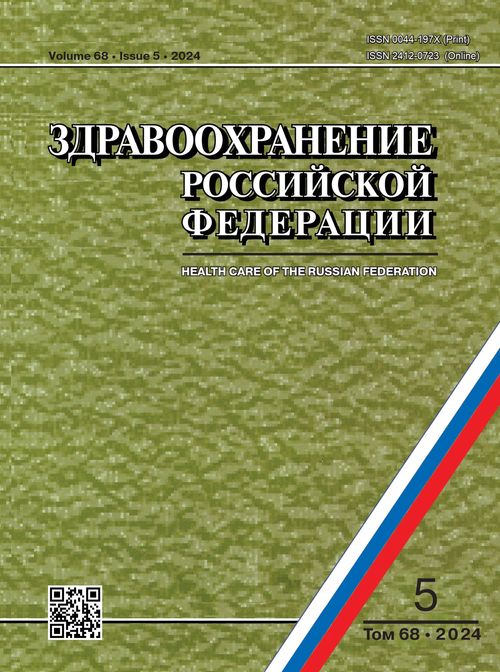Трудовая мобильность медицинских специалистов: установки и факторы
- Авторы: Коленникова О.А.1,2, Токсанбаева М.С.1,2
-
Учреждения:
- ГБУ города Москвы «Научно-исследовательский институт организации здравоохранения и медицинского менеджмента Департамента здравоохранения города Москвы»
- Институт социально-экономических проблем народонаселения ФГБУН «Федеральный научно-исследовательский социологический центр Российской академии наук»
- Выпуск: Том 68, № 5 (2024)
- Страницы: 371-378
- Раздел: ОРГАНИЗАЦИЯ ЗДРАВООХРАНЕНИЯ
- Статья получена: 14.01.2025
- URL: https://hum-ecol.ru/0044-197X/article/view/646193
- DOI: https://doi.org/10.47470/0044-197X-2024-68-5-371-378
- EDN: https://elibrary.ru/expkll
- ID: 646193
Цитировать
Полный текст
Аннотация
Введение. Сфера здравоохранения отличается невысокими масштабами трудовой мобильности медицинских специалистов.
Цель исследования — выявление причин внутрифирменной и межфирменной мобильности в сфере здравоохранения, которые сопряжены с готовностью к профессионально-квалификационному росту, а также с внешними и внутренними условиями занятости.
Материалы и методы. Исследование опиралось на нормативные документы Министерства здравоохранения РФ и Правительства Москвы. Статистическую базу составили данные Росстата и ведомственной статистики Департамента здравоохранения города Москвы, а также материалы экспертного и анкетного опросов московских медицинских специалистов.
Результаты. Сравнительно небольшие масштабы межфирменной мобильности медицинских специалистов в столичном регионе во многом вызваны схожестью условий занятости в бюджетной сфере, в которую входят большинство организаций здравоохранения. Это сдерживает переход кадров в другие организации, хотя такая их специфика, как значительная трудовая нагрузка на персонал и невысокая оплата труда, вряд ли устраивает специалистов. При этом значительная часть врачей и сестринского персонала обладает активными установками на профессионально-квалификационный рост. Их реализации должен способствовать институт аттестации на квалификационную категорию, однако его несовершенство не позволяет справляться с данными функциями.
Ограничения исследования. Из-за скудости официальной статистики по проблематике исследования его основой стали экспертный и анкетный опросы медицинских специалистов, которые по определению дают главным образом субъективную информации и ограниченно фактологические данные.
Заключение. Чтобы институт аттестации медицинских специалистов на квалификационную категорию мог выполнять возложенные на него функции, следует дополнить его работу программами профессиональной подготовки по категориям, повысить за них доплату, увязать категориальный и должностной статусы. Необходимо также принимать меры по снижению трудовой нагрузки на персонал и повышению оплаты труда, чтобы сдерживать нежелательные последствия оттока кадров из сферы здравоохранения.
Соблюдение этических стандартов. Исследование одобрено Этическим комитетом по экспертизе исследований в сфере общественного здоровья, организации и социологии здравоохранения при ГБУ города Москвы «НИИ организации здравоохранения и медицинского менеджмента Департамента здравоохранения города Москвы» (протокол № 03-01/ЭК/2023 от 14.03.2023).
Для корреспонденции: Токсанбаева Майраш Сейтказыевна, доктор экон. наук, науч. сотр. ГБУ города Москвы «НИИ организации здравоохранения и медицинского менеджмента ДЗМ», 115088, Москва. E-mail: matoksan@mail.ru
Участие авторов:
Токсанбаева М.С. — концепция и дизайн исследования, редактирование, составление списка литературы;
Коленникова О.А. — сбор и обработка материала, статистическая обработка.
Все соавторы — написание текста, утверждение окончательного варианта статьи, ответственность за целостность всех частей статьи.
Финансирование. Исследование не имело спонсорской поддержки.
Конфликт интересов. Авторы декларируют отсутствие явных и потенциальных конфликтов интересов в связи с публикацией данной статьи.
Поступила 29.05.2024 / Принята к печати 03.10.2024 / Опубликована 06.11.2024
Об авторах
Ольга Александровна Коленникова
ГБУ города Москвы «Научно-исследовательский институт организации здравоохранения и медицинского менеджмента Департамента здравоохранения города Москвы»; Институт социально-экономических проблем народонаселения ФГБУН «Федеральный научно-исследовательский социологический центр Российской академии наук»
Email: kolennikova@mail.ru
ORCID iD: 0000-0002-0138-6115
Канд. эконом. наук, науч. сотр. ГБУ города Москвы «Научно-исследовательский институт организации здравоохранения и медицинского менеджмента Департамента здравоохранения города Москвы» (ГБУ НИИОЗММ ДЗМ), 115088, Москва, Россия; вед. науч. сотр., Институт социально-экономических проблем народонаселения Федерального научно-исследовательского социологического центра РАН, 117218, Москва
e-mail: kolennikova@mail.ru
Майраш Сейтказыевна Токсанбаева
ГБУ города Москвы «Научно-исследовательский институт организации здравоохранения и медицинского менеджмента Департамента здравоохранения города Москвы»; Институт социально-экономических проблем народонаселения ФГБУН «Федеральный научно-исследовательский социологический центр Российской академии наук»
Автор, ответственный за переписку.
Email: matoksan@mail.ru
ORCID iD: 0000-0002-3570-592X
Доктор эконом. наук, науч. сотр., ГБУ НИИОЗММ ДЗМ, 115088, Москва, Россия; гл. науч. сотр., зав. лабораторией, Институт социально-экономических проблем народонаселения Федерального научно-исследовательского социологического центра РАН, 117218, Москва, Россия
e-mail: matoksan@mail.ru
Список литературы
- Заславская Т.И., Рывкина Р.В., ред. Методологические проблемы социологического исследования мобильности трудовых ресурсов. Новосибирск: Наука; 1974.
- Астафьева Н.Н. Государственное регулирование трудовой мобильности: возможности и ограничения. Экономика: вчера, сегодня, завтра. 2017; 7(3А): 134–42. https://elibrary.ru/zepumn
- Кипевар Е.А., Побиянская А.В., Дубровин А.М. Трудовая мобильность лиц старших возрастных групп. Экономика труда. 2022; 9(1): 149–60. https://doi.org/10.18334/et.9.1.113982 https://elibrary.ru/aahaxv
- Макушева Ю.А., Стрелкова Л.В., Черней О.Т. Трудовая мобильность персонала в условиях инновационного развития Нижегородской области. Вестник Нижегородского университета им Н.И. Лобачевского. 2013; (1): 93–6. https://elibrary.ru/qlibhl
- Вильховская Е.Э. Классификация и анализ подходов к трактовке сущности трудовой мобильности. Вестник Омского университета. Серия «Экономика». 2017; (3): 88–96. https://doi.org/10.25513/1812-3988.2017.3.88-96 https://elibrary.ru/zuexmf
- Кутаев Ш.К. Управление социально-экономическим развитием регионов и трудовыми ресурсами на основе стимулирования трудовой мобильности населения. Региональные проблемы преобразования экономики. 2018; (1): 61–8. https://elibrary.ru/xmthmd
- Платонова Р.И., Михина Г.Б. Актуальность soft skills в профессиональном плане будущих специалистов. Азимут научных исследований: педагогика и психология. 2018; 7(4): 177–81. https://elibrary.ru/ythgol
- Молодецкая В.С. Трудовая мобильность: трансформация теоретических подходов в условиях общественных изменений. Вестник Поволжского института управления. 2018; 18(2): 104–11. https://doi.org/10.22394/1682-2358-2018-2-104-111 https://elibrary.ru/uqklqd
- Харламова Т.Л., Чагина Е.А. Оценка результативности программ территориальной мобильности трудовых ресурсов с позиции формирования и развития человеческого капитала. Известия Санкт-Петербургского государственного экономического университета. 2017; (6): 52–6. https://elibrary.ru/zvlfsj
- Гимпельсон В.Е., Капелюшников Р.И., Шарунина А.В. «Дороги, которые мы выбираем»: перемещения на внешнем и внутреннем рынках труда. Экономический журнал ВШЭ. 2016; 20(2): 201–42. https://elibrary.ru/wmotzh
- Вакуленко Е.С. Сравнительный анализ межрегиональной и межсекторной мобильности в России. Экономика региона. 2020; 16(4): 1194–207. https://doi.org/10.17059/ekon.reg.2020-4-13 https://elibrary.ru/fuospf
- Аксенова Е.И., Александрова О.А., Аликперова Н.В., Бог-дан И.В., Бурдастова Ю.В., Виноградова К.В. и др. Развитие кадрового потенциала столичного здравоохранения. М.; 2019. https://elibrary.ru/dvhztq
- Забелина О.В., Мирзабалаева Ф.И. Предпосылки профессиональной и межотраслевой мобильности российских работников. Экономика труда. 2020; 7(8): 659–76. https://doi.org/10.18334/et.7.8.110727 https://elibrary.ru/runvrc
- Аксенова Е.И., ред. Организационно-кадровые механизмы повышения эффективности работы медицинских организаций. М.; 2022.
Дополнительные файлы









